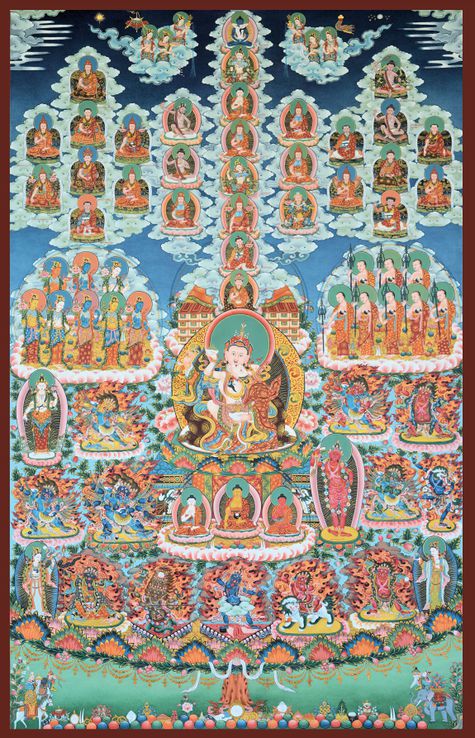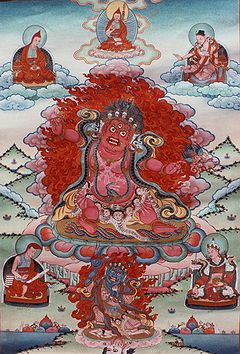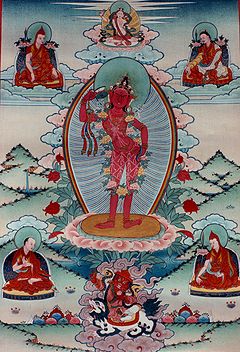Heart Essence of the Vast Expanse: Difference between revisions
No edit summary |
Bj Lhundrup (talk | contribs) No edit summary |
||
| (2 intermediate revisions by one other user not shown) | |||
| Line 1: | Line 1: | ||
<noinclude>[[Longchen Nyingtik]]</noinclude><br> | |||
<noinclude>[[klong chen snying thig]]</noinclude><br> | |||
<noinclude><span class=TibUni16>[[ཀློང་ཆེན་སྙིང་ཐིག]]</span></noinclude><br> | |||
{{:Longchen Nyingtik}} | |||
[[Category:Key Terms]][[Category:Glossary]][[Category:Teachings]] | |||
= | |||
[[Category: Key Terms]] [[Category: | |||
Latest revision as of 13:53, 15 November 2008
Longchen Nyingtik
klong chen snying thig
ཀློང་ཆེན་སྙིང་ཐིག
- Visions (dag snang) of 'jigs med gling pa; Longchen Nyingtig. the Heart Essence of the Great Expanse / Longchenpa. A cycle of teachings revealed to Jigmey Lingpa in three visions of Longchenpa; terma revealed by Rigdzin Jigme Lingpa. (RY)
- A mind-treasure revealed by Rigdzin Jigme Lingpa. (RY)
- Nyingma terma ('jigs med gling pa's dgongs gter). (IW)
- Longchen Nyingthig, "The Heart Essence of the Great Expanse" (the cycle of teachings revealed to Jigme Lingpa in three visions of Longchen Rabjampa klong chen rab 'byams pa - Longchen Rabjam [1308-1363) the great Nyingma master Longchenpa Drimey Oser - Longchenpa, Longchen Rabjampa (1308-1363) the great Nyingmapa master Longchenpa Drimey Oser; rnying ma'i slob dpon klong chen pa dri med 'od zer zhes pa dbus lho gyo ru gra'i cha stod grong du rab byung lnga pa'i sa sprel lor 'khrungs / rab byung drug pa'i chu yos lor 'das / ta'i si tu byang chub rgyal mtshan dang dus mnyam yin / khong gis mdzad pa'i mdzod chen bdun dang / snying thig ya bzhi / ngal gso skor gsum / rang grol skor gsum sogs chos tshan brgya phrag gnyis lhag tsam yod. (IW)
- Longchen Nyingthig, the heart essence of the great expanse. (IW)
- Heart Essence of the Great Expanse, mind-treasure revealed by Jigmey Lingpa. (RY)
- Essence of the mind of Longchenpa, 'jigs med gling pa's synthesis of rdzogs chen snying thig teachings. (JV)
- Longchen Nyingtig, Heart Essence of the Great Expanse. (RY)
Brief History
The Longchen Nyingthig is a Terma cycle revealed by the master Rigdzin Jigme Lingpa. Since its inception in the late 18th century, it has become one of the most widespread sets of teachings in the Nyingma tradition. It is particularly known and loved for its extensive commentarial literature, which includes practice manuals such as the famed Yeshe Lama.
These teachings were originally transmitted by the master Padmasambhava to King Trisong Deutsen, the Dakini Yeshe Tsogyal and the Lotsawa Vairochana at Samye Monastery in central Tibet. As the time for these teachings to spread was not yet right, they were then written in symbolic script by [[Yeshe Tsogyal], entrusted to the Dakinis, and hidden to be revealed at a later time. The king later reincarnated as the Treasure Revealer Jigme Lingpa, who recalled the teachings he had received and, recognizing the time was ripe for them to be practised, put them down in writing and began to teach.
Jigme Lingpa, the Terton who revealed this cycle of teachings, was a reincarnation of two important masters, Vimalamitra and King Trisong Deutsen. As the embodiment of these two figures, Tibet's two primary Dzogchen lineages were combined in Jigme Lingpa -- the Vima Nyingthig and Khandro Nyingthig, both of which are contained in the Nyingthig Yabshi. Hence, the Longchen Nyingthig terma cycle is considered a condensation of these profound teachings.
The texts that were revealed by Jigme Lingpa, in their present-day form, comprise three volumes, known as the Nyingthig Tsapod (snying thig rtsa pod). The numerous treatises, sadhanas and prayers it contains deal primarily with tantric practice, in particular the stages of Development Stage and Dzogchen.
Lineage
- The Present day lineages transmitted down from the many students of Rigdzin Jigme Lingpa have spread and are practice throughout every corner of this realm, however there where four main "Heart Sons" that became crucial to the dissemination of the lineage, which in turn created a number of lineages of transmission down to present masters.
The primary lineage is as follows
The Four Main Lineage Holders
- Jigme Lingpa's four primary students known as "The Four Jigmes"
From Jigme Lingpa's heart son Jigme Trinle Ozer to the present Dodrupchen Rinpoche
From Jigme Lingpa's heart son Jigme Gyalwe Nyugu to the present Chatral Rinpoche
From Jigme Lingpa's heart son Jigme Gyalwe Nyugu to the present Penor Rinpoche
- Patrul Rinpoche
- Lungtog Tenpe Nyima
- Khenpo Ngagchung [1879-1941]
- Rigdzin Palchen Düpa [1887-1932] (2nd Drubwang Padma Norbu)
- Thubten Chokyi Dawa (2nd Tarthang Choktrul Rinpoche)
- Penor Rinpoche [1932-2009] (3rd Drubwang Padma Norbu)
- Patrul Rinpoche
Other Lineage Masters
- Mingyur Namkhai Dorje (the fourth Dzogchen Rinpoche)
- Onpo Tendzin Norbu
- Adzom Drukpa
- Rigdzin Palchen Düpa (second Pema Norbu Rinpoche)
- Thubten Chokyi Dorje (the fifth Dzogchen Rinpoche)
- Yukhok Chatralwa
- Jamyang Khyentse Chokyi Lodro
- Dilgo Khyentse Rinpoche
- Gonpo Tseten Rinpoche
Primary Sadhanas
The Longchen Nyingthig cycle relates primarily to the teachings of Dzogchen, particularly the Innermost Essence teachings. Though there are various practices and Sadhanas found in this tradition, such practices are often approached from this Dzogchen perspective. These practices include:
- Preliminary Practice (sngon 'gro):
- Peaceful Male Vidyadhara Sadhanas:
- Outer Guru Practice: Guru Yoga (bla ma'i rnal 'byor)
- Inner Guru Practice: Rigdzin Dupa (rig 'dzin 'dus pa)
- Secret Guru Practice: Dukngal Rangdrol (sdug bsngal rang grol)
- Utmost Guru Secret Practice: Ladrup Thigle Gyachen (bla sgrub thig le'i rgya chen)
- Wrathful male Vidyadhara Sadhanas:
- Palchen Dupa (dpal chen 'dus pa) and its related practices:
- Yamantaka: Overpowering The Lord Of Death ('jam dpal gshin rje 'chi bdag zil gnon)
- Hayagriva: Reveling In The Three Realms (rta mgrin khams gsum rol pa)
- Visuddha: Union Of The Buddhas (yang dag sangs rgyas mnyam sbyor)
- Vajrakilaya: Overpowering The Hordes Of Mara]] (phur pa bdud dpung zil gnon)
- Lama Dragpo Takyung Barwa: (bla ma drag po rta khyung 'bar ba)
- Palchen Dupa (dpal chen 'dus pa) and its related practices:
- Female Vidyadhara Sadhanas:
- Dharma Protector (gsol kha) Practices:
- Protectress Magon Chamdrel (bka’ srung ma mgon lcam dral)
- ProtectressThe Five Medicine Sisters (bka' srung sman btsun mched lnga)
- Other MiscellaneousPractices:
- Cleansing The Lower Realms: The Peaceful And Wrathful Deities (zhi khro ngan song sbyong ba)
- Chod Practice: The Bellowing Laugh of the Dakinis (mkha' 'gro gad rgyangs)
- Purifying The Realm Of Complete Joy: A Guru Yoga On Vajrasattva (rdo rje sems dpa' la brten pa'i bla ma'i rnal 'byor mngon dga'i zhing sbyong)
Primary Texts
The main Tantras and Pith-instructions
- Kuntuzangpo Yeshe Long Ki Gyu (kun tu bzang po ye she klong gi rgyud)
- Gyu Chima (rgyud phyi ma)
- Nesum Shenje (gnad gsum shan 'byed), Three Keypoints of Discernment.
- Neluk Dorje Tsik-kang (gnas lugs rdo rje tshig rkang)
- Yeshe Lama (ye shes bla ma) and its supporting commentaries
Preliminary Practice Instructions
- The Steps to Liberation (thun mong gi sngon 'gro sems sbyong rnam pa bdun gyi don khrid thar ba'i them skas thar ba'i them skas)
- Establishing Practice (rdzogs pa chen po klong chen snying thig gi thun mong gi sngon 'gro khrid kyi lag len la 'debs lugs)
- Establishing Mindfulness (rdzogs pa chen po klong chen snying thig gi thun mong ma yin pa'i sngon 'gro'i khrid yig dran pa nyer gzhag)
Development Stage Instructions
- The Ladder to Akanishta ('og min bgrod pa’i them skas)bskyed rim lha’i khrid kyi rnam par gzhag pa)
- The Advice of Palchen (yo ga gsum gyi spyi chings dpal chen zhal lung)
Completion Stage Instructions
- A Wish-fulfilling Jewel: A Condensation of the Oral Lineage for Completion Stage, Bliss-emptiness Energy (bde stong rlung gi rdzogs rim snyan rgyud shog dril yid bzhin nor bu)
- A Short Text on the Blazing and Dripping of Tummo (gtum mo'i 'bar 'dzag yig chung)
Prayers and Aspirations
Present Day Teachers of the Longchen Nyingthig
- Thubten Trinle Palzangpo (fourth Dodrupchen Rinpoche)
- Chatral Rinpoche
- Penor Rinpoche
- Trulshik Rinpoche
- Dzigar Kongtrul Rinpoche
- Dzongsar Khyentse Rinpoche
- Sogyal Rinpoche
- Pema Wangyal Rinpoche
- Shechen Rabjam Rinpoche
- Jigme Losel Wangpo (the seventh Dzogchen Rinpoche)
- The son of Adzom Druktrul (name unknown)
- Traktung Rinpoche
- Tulku Thondup
Longchen Nyingthig Literature in Translation
- Works on the Longchen Nyingthig Ngondro:
- Patrul Rinpoche (1994). Words of My Perfect Teacher. Translated by the Padmakara Translation Group. San Francisco: HarperCollins. ISBN 978-1570624124
- Ngawang Pelzang, Khenpo (2004). A Guide to the Words of My Perfect Teacher. Translated by the Padmakara Translation Group. Boston: Shambhala Publications. ISBN 978-1590300732
- An Elucidation of The Path To Excellent Omniscience. Translated by the Vajravairochana Translation Committee. Halifax: Vajravairochana Translation Committee, 1996.
- Thondup, Tulku (1982). Dzogchen: Innermost Essence Preliminary Practice. India: Library of Tibetan Works and Archives.
- Works on Development Stage:
- Ladder to Akanishta. Included in Deity, Mantra and Wisdom. Translated by Dharmachakra Translation Committee.
- Works on Dzogchen:
- Yeshe Lama. Translated by Sangye Khandro.
- Van Schaik, Sam (2004). Approaching the Great Perfection. Boston: Wisdom Publications.
- Sadhana Practices:
- The Queen of Great Bliss of Long-Chen Nying-Thig. Translated by Tulku Thondup. Sikkim: Published by Dodrup Chen Rinpoche, 1992. A translation of the Yumkha Dechen Gyalmo sadhana.
- The Assemblage of Vidyadharas of Long-Chen Nying-Thig. Translated by Tulku Thondup. Sikkim: Published by Dodrup Chen Rinpoche, 1992. A translation of the Rigdzin Dupa sadhana.
Other References
- Thondup, Tulku (1996) Masters of Meditation and Miracles. Boston: Shambhala Publications. - The most complete reference on the lineages and practices of the Longchen Nyingthig in the English language.
- Gyatso, Janet (1998). Apparitions of the Self. Princeton: Princeton University Press. - Contains translations of two biographies of Jigme Lingpa.
- The Dzogchen Lineage of Nyoshul Khenpo
Alternate Names and Spellings
- Heart Essence of the Vast Expanse
- Heart Essence of the Great Expanse
- Heart Essence of Longchenpa
Internal Links
- Longchen Nyingthig Masters[1]
- Dodrubchen Monastery
- Dzogchen Monastery
- Palyul Monastery
- Wylie text from the Longchen Nyingtik
- Choying Dzo "chos dbyings rin po che'i mdzod" by Kunkyen Longchenpa
- rdzogs pa chen po'i gnad gsum shan 'byod By Rigdzin Jigme Lingpa
- man ngag rdzogs pa chen po'i rgyud phyi ma By Rigdzin Jigme Lingpa
- kung tu bzang po'i dgongs nyams By Rigdzin Jigme Lingpa



